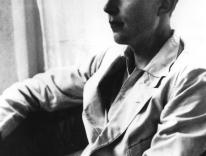In its Fall 2008 issue, The Paris Review interviews Marilynne Robinson. The whole thing is worth reading, but one exchange is especially interesting.It may be true that real religious experienceis incompatible with a merely instrumental understanding of religion. But, as Robinson makes clear,this doesn't mean that religious believers are unconscious or disdainful of the usefulness of religious belief and practice. Here the interviewer refers to the main character in Robinson's 2004 novel, Gilead:
INTERVIEWER
Ames believes that one of the benefits of religion is it helps you concentrate. It gives you a good basic sense of what is being asked of you and also what you might as well ignore. Is this something that your faith and religious practice has done for you?
ROBINSON
Religion is a framing mechanism. It is a language of orientation that presents itself as a series of questions. It talks about the arc of life and the quality of experience in ways that Ive found fruitful to think about. Religion has been profoundly effective in enlarging human imagination and expression. Its only very recently that you couldnt see how the high arts are intimately connected to religion.
INTERVIEWER
Is this frame of religion something weve lost?
ROBINSON
There was a time when people felt as if structure in most forms were a constraint and they attacked it, which in a culture is like an autoimmune problem: the organism is not allowing itself the conditions of its own existence. Were cultural creatures and meaning doesnt simply generate itself out of thin air; its sustained by a cultural framework. Its like deciding how much more interesting it would be if you had no skeleton: you could just slide under the door.
The interviewerturns to the subject of science and religion -- and to Robinson's criticism of the New Atheists. Robinson insists that science and religious faith seemincompatibleonly to one who hasa "naiveunderstanding of religion and a naive understanding of science."
INTERVIEWER
But doesnt science address an objective notion of reality while religion addresses how we conceive of ourselves?
ROBINSON
As an achievement, science is itself a spectacular argument for the singularity of human beings among all things that exist. It has a prestige that comes with unambiguous changes in peoples experiencespace travel, immunizations. It has an authority thats based on its demonstrable power. But in discussions of human beings it tends to compare downwards: were intelligent because hyenas are intelligent and we just took a few more leaps. The first obligation of religion is to maintain the sense of the value of human beings. If you had to summarize the Old Testament, the summary would be: stop doing this to yourselves. But it is not in our nature to stop harming ourselves. We dont behave consistently with our own dignity or with the dignity of other people. The Bible reiterates this endlessly.


